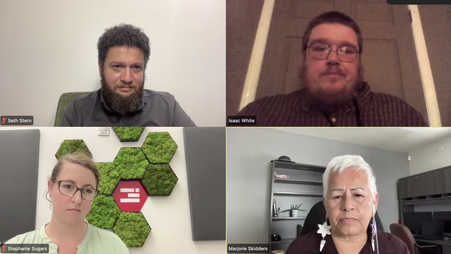For months now, pandering U.S. lawmakers have their sights set on silencing nonprofit organizations — potentially including media outlets and press freedom groups.
They haven’t gotten their way yet but the fight’s not over. Freedom of the Press Foundation (FPF) has repeatedly joined plenty of other organizations to publicly shame these anti-speech officials for their cynical attempts to weaponize the IRS against opinions they don’t like.
And the resistance seems to be working — at least so far.
Bill to censor nonprofits stalls twice
Earlier this year, the House passed a bill that would allow the secretary of the Treasury to revoke nonprofits’ tax-exempt status, without due process and using secret evidence, by deeming them supporters of terrorists.
We wrote for The Intercept last spring about the implications for nonprofit media, especially in light of recent letters from lawmakers baselessly accusing outlets that are critical of Israel of supporting terror. Others wrote about the potential for the powers contemplated by the bill to be abused against environmental organizations, student groups, and others.
The Council on American-Islamic Relations led a letter signed by 135 organizations (including FPF) objecting to the bill in May. The ACLU also sent its own letter. And the bill died in the Senate soon after, when efforts to attach it to the Federal Aviation Administration’s reauthorization legislation failed (no, we don’t know what the bill had to do with aviation).
It returned in September. This time, lawmakers tried attaching it to legislation granting tax benefits to American hostages and held a hearing on Sept. 11, effectively daring anyone to question a purported anti-terrorism bill on that day.
That backfired when The Washington Post called out their willingness to undermine the chances of the hostage bill for the sake of censoring nonprofits. It also further galvanized the opposition among nonprofits, with the ACLU sending another letter to House leadership, signed by over 120 organizations, again including FPF. The bill again stalled.
Censorial lawmakers resort to Plan B
Unable to legislate new power to silence nonprofits, lawmakers are claiming they already can under existing authority, citing decades-old IRS guidance on nonprofits that support criminality.
Republican House Ways and Means Committee Chair Jason Smith sent a letter on Sept. 24, baselessly demanding the IRS revoke the nonprofit tax-exempt status of 15 organizations that advocate for Palestinian human rights. Speaker of the House Mike Johnson tweeted the letter the next day, tagging many of the organizations and further threatening them on behalf of House Republicans.
The organizations named in the letter weren’t news outlets, but given that Smith didn’t cite any supposedly illegal activities besides encouraging dissent (the theory, presumably, is that the organizations are on the hook for any lawlessness that takes place at a protest they promote), it’s not hard to imagine similar arguments against news outlets that platform similar views.
We once again joined the Council on American-Islamic Relations and 100 other groups to admonish Smith and Johnson for their disregard of the First Amendment. Calling their tactics “reminiscent of the McCarthy era,” the letter notes that their “bad-faith referral to the IRS is not based on any legitimate concerns of criminal conduct by these organizations. Instead, it stems from your personal discomfort with their constitutionally protected activities.”
It goes on to note the hypocrisy behind the call for censorship, as Republicans in Congress have been quick to accuse the IRS and other federal agencies of unfairly investigating First Amendment activity — but only when they like the message of those speaking.
The groups’ letter also warns against further attempts to advance this flawed legislation or similar bills, which would “undermine fundamental due process protections and would empower the government to target civil rights, humanitarian, journalistic, and advocacy organizations based on their political positions.”
Although efforts to push back against these outrageous assaults on nonprofits seem to have been successful so far, it’s clear they have staying power. And while the Smith letter was Republican-led, Democrats joined in pushing the legislation through the House — meaning this nonsense will likely persist no matter how the November election goes.
Any nonprofits, media outlets, or free speech advocates that haven’t spoken up yet should not let the next opportunity pass them by.





